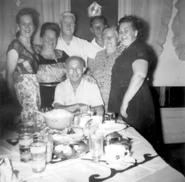| Joseph John Szczesny | |

| |
| Sex: | Male |
|---|---|
| Birth: | April 3, 1920 in Jersey City, New Jersey |
| Death: | August 21, 1997 in Ocean County, New Jersey |
| Father: | Feliks Szczęsny (1888-1926) (natural) Anthony Szejnrok (?-?) (step) |
| Mother: | Klawija Dzyban (1891-1990) |
| Siblings: | Walter Szczesny (c1916-1974) Anna Szczesny (c1918-1987) Helen Szejnrok (c1928-) (half) Theodore Szejnrok (c1929-) (half) |
| Spouse/Partner: | Margaret Rice (1924-2007) |
| Marriage: | May 29, 1948 in Hoboken, Hudson County, New Jersey |
| Children: | Kathleen Szczesny (1949-) Barbara Szczesny (1952-) Deborah Szczesny (c1959-) |
Joseph John Szczesny (1920-1997) was a longshoreman, a veteran of World War II, and the father of three daughters.
Birth[]
Joseph was born April 3, 1920 in Jersey City, Hudson County, New Jersey to parents Felix Szczesny and Klawija Dzyban (a.k.a. Clara Dzyban). Felix was an ethnic Pole and Clara was a Lemko. At the time of his birth, his parents resided at 162 Steuben Street in Jersey City.
Childhood[]
Death of Joseph's Father in 1926[]
Joseph's father Felix died in 1926, when Joseph was about 6 years old, after which he was raised by his mother, who subsequently married Anthony Szejnrok (?-?) in 1927 or 1928. Felix was stabbed while breaking up a fight involving one of his friends, outside of a bar near the family's apartment in Jersey City. Joseph remembered watching his father holding his abdomen on the stairs to the family apartment after having been stabbed in the intestines and/or stomach. Felix said a few last words to Joseph before his death, to which Joseph remembered being too frightened to respond, due to the shocking nature of the event.
The Great Depression[]
Joseph grew up during the Great Depression. Since his mother and step-father were both first-generation immigrants to the United States from Poland, who were already poor prior to the Great Depression, Joseph's family experienced extreme poverty during his youth. Joseph even had to drop out of Our Lady of Czestochowa School while still in the 6th grade to help earn money to support his mother.
Swimming in the Hudson River[]
Joseph and his childhood friends used to swim under the barges in the Hudson River. They would race to see who could swim across the width of the boats the fastest. Once, Joseph's mother found out about this dangerous activity and chased him around the house to catch him and scold him.
Joseph's Best Friend Ben Dyleski[]
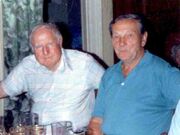
Ben Dyleski & Joseph Szczesny
Joseph's best friend since childhood was Ben Dyleski. Joseph and Ben maintained their friendship through Joseph's entire life, and after Joseph's death, Ben still wrote letters to Joseph's widow Margaret. Although in poor health, Ben is still living as of 2007.
Joseph’s Aspirations to Become a Pilot[]
Throughout his youth, Joseph wanted to be a pilot, and in his early adulthood, he signed up for pilot training. Joseph was selected to begin pilot training, but missed the call, and another individual was selected in his place. Joseph later stated that in the long run, he was glad that he missed this opportunity, because if he had become a pilot, he would have been unlikely to have met his future wife, to which he remained married for 49 years, until his death.
World War II[]
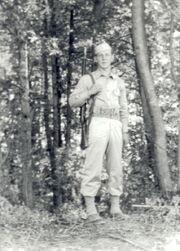
Joseph John Szczesny training at Fort A.P. Hill in Virginia in 1942.
Joseph was in the 29th Infantry Division during World War II. He participated in the Allied invasion of Normandy Beach. He enlisted in the army on February 6, 1942.[1]
Training[]
Joseph trained at A.P. Hill Military Reservation and at Camp Lee, both in Virginia. During his training, Joseph reached the level of expert marksman. He obtained several medals for his achievements during training.
Service in England[]
Joseph was stationed in England for a while. During his stay, the English and American soldiers did an exchange program. Joseph explained that the English soldiers looked forward to the exchange, since the American soldiers had much better accomodations.
Joseph's Essay on D-Day[]
The following is an essay Joseph wrote in 1994 to commemorate the 50th anniversary of D-Day.
One Soldier's Brief Recollection of D-Day
We were told to make our own daggers for the invasion. I still have mine, which I keep for a souveneir. We were issued gas masks and chemically impregnated clothing, in case of a mustard gas attack. After months of training and briefing, the 29th infantry division (the blue and the grey) in which I served was ready to go. Finally, stationed in Falmouth, England, where we scrutinized every large scale aerial map taken of Normandy, every building, crossroad, church, even the bushes and hedgerows were memorized.
We slept in our vehicles on the landing craft, waiting for a channel storm to subside. One tank ripped away from its lashings, close to me and slid off the deck into the channel during the night. All vehicles were loaded down with tons of ammunition and cans of gasoline. Spark plugs were covered with a waterproofing compound and exhaust pipe was bent and extended upward above the cabs so that the water would not stall the motor when in low range and in low gear, we drove off the landing craft onto the beach.
After three days on a monotanous rolling landing craft, a lot of us began to get constipated, including byself (ha.ha.)
The word went out to go, and so we sailed out that night across the English channel towards Normandy. The bombers overheated, were making their bombing sorties, wave after wave from England, all night long.
Just a few miles from the French shore, I couldn't get over how tranquil everything seemed to look. Dawn was breaking over the cliffs ahead at Pointe du Huc, where the rangers were to scale them. Omaha beach loomed in front of us. The 116th infantry hit the beach. The engineers went in to clear the obstacles off the beach.
All of our vehicles were driven off the landing craft onto a Rhino barge in mid channel. In the meantime, the battle ship Texas was firing broadsides with its heavy guns every twenty minutes over our heads. Destroyers weaved in and out close to shore, serving as our artillery. Then a naval boat shoved our Rhino barge into the beach head where I came down into the pebbled beach of Omaha.
Everything seemed to be working like clock work until I began to feel a sinking sensation when the heavy laden vehicle slowly started to wallow in those rounded pebbles as if in quicksand. An army tank quickly threw a hook on the front steel bumper and helped pull me in.
Those faint puffs of grey I observed from a distance suddenly became ear splitting bursts, and that tranquil scene I observed earlier, instanty vanished. Mortars, eighty eight mm shells, everything was exploding everywhere along the beach. Bursts of machine gun fire whistled in our ears. I wondered if I would live the day.
H-hour seemed but a moment ago, but strangely, the fire fights had subsided and the darkness of the impending night was slowly hiding the bodies of soldiers strewn along the sand. It left me wondering, that perhaps, they were only sleeping?, but in the next light of morning, I knew they were all dead.
Happy fiftieth anniversary . . . old buddies!
Joseph's Essay on the Execution of Eddie Slovik[]
The following essay was found among Joseph's possessions after his death. The essay was in the form of two unfinished, untitled, handwritten drafts. The two drafts, written in 1994, were combined and edited by Joseph's grandson Kevin Borland when they were discovered in 2007.
Deliberately Missing the Mark
After reading an article in our New Jersey newspaper about the execution, 50 years ago, of Eddie Slovik, the only American soldier to be executed since the Civil War, it suddenly propelled me back in time to 1944, to an incident in World War II, and how it touched some of us then.
I served in the 29th Infantry Division and after hitting Omaha Beach in Normandy, France, on D-day, June 6th, we took St. Lo, then swung to Brest, then barreled up through France, Belgium, Luxemburg, Holland, and finally to Aachen in Germany. It was then, after the last Germans pushed toward Antwerp (battle of the bulge), that a directive came from division headquarters, looking for a soldier who scored high on the firing range.
I had made expert with my rifle way back in Camp Lee, Virginia, when they had the Springfield O.B. (type of rifle), and later in England with the M. rifle. As a matter of fact, I was the best shot in the company. A buddy of mine called Sampson who came from Alabama remarked that he never knew that a yankee could shoot so good.
At any rate, our commanding officer, Danny Nate, following this directive, asked for volunteers, and knowing that I had made expert, he took it for granted that I would volunteer. I thought this to be a very odd request.
About that time, a dependable G.I. rumor started to circulate around that an American soldier was to be executed and they were looking for a firing squad to execute the soldier for refusing to fire his rifle at the enemy. The rumor caught up to me by the time the commanding officer called me in. I was told to fire, for the record, at a paper target. He said it was only a formality. I decided right then that if they wanted someone to execute a soldier (especially one of our own), it wasn’t going to be me, and so I deliberately foulded up with the target shooting. I hurt my C.O.’s ego, because some weeks later he took it out on me (which is another story), but I have no regrets for doing what I did, because I came home after the war with a clean conscience. I knew I made the right decision, and it was infinitely satisfying for me.
Besides, every soldier knows never to volunteer for anything in the army.
Post-War Military Service[]
Joseph was a member of the Army Corps of Engineers after the war. He worked in the area of forest and park maintenance. His duties included fighting forest fires in Oregon, and building rock walls in some of New Jersey’s parks, including Palisades Park. Joseph was eventually honorably discharged from United States military service, after he turning down an opportunity to be an officer.
Marriage to Margaret Rice[]
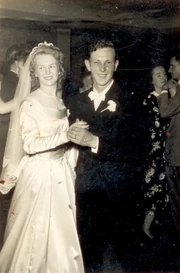
Margaret & Joseph dancing at their wedding (1948)
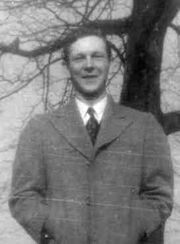
Joseph in 1947
Sometime in 1946, Joseph Szczesny met a young Lithuanian woman by the name of Margaret Rice. Margaret was a friend of one of Joseph's cousins, Anna (Szczesny) Wozniak, who introduced the couple to each other. Over the course of the next two years, every Friday or Saturday, when Joseph didn't have work, he took a bus from his home in Jersey City to nearby Hoboken, New Jersey, to visit Margaret. He would buy her a box of chocolate from Loft's Candy Store, and then take her to see a musical in New York. On May 29, 1948, Joseph and Margaret joined in marriage at Our Lady of Grace, a Catholic church in Hoboken. The newly wed couple went to the Berkshires in Massachusetts for their honeymoon. The receptionist at their hotel in the Berkshires loaned them a car, since it was off-season. Tora Lora Lora was Joseph and Margaret's wedding song.
Children by Margaret Rice[]
Joseph and Margaret had a total of three daughters. In order of birth, they are listed as follows:
Occupation After Marriage[]
After marriage, Joseph was employed as a longshoreman on the docks in Jersey City. He unloaded cargo from the American President Lines ships that came into the port along the Hudson River. At some point, he received further training to operate the cranes that lifted cargo containers off of the ships. Occasionally, he also drove foreign automobiles off the boats. He also manually loaded and unloaded cargo from the ships. Joseph belonged to the International Longshoreman Association (ILA).
Life in the 1950s[]
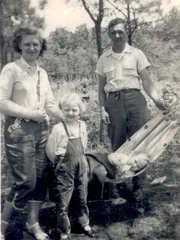
Joseph Szczesny family in the early 1950s. Pictured are Margaret (Rice) Szczesny, Kathleen Szczesny, Barbara Szczesny and Joseph Szczesny.
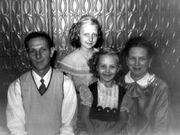
Joseph Szczesny family in the late 1950s. Pictured are Joseph Szczesny, Kathleen Szczesny, Barbara Szczesny and Margaret (Rice) Szczesny.
The Szczesny family was poor throughout the 1950s. Joseph would often go to the train tracks and look for potatoes that fell off the train cars to feed his family. In 1950, the family lived on Washington Street in Hoboken. That was probably where Joseph and Margaret lived from the time they were married. Margaret's mother Eva (Douse) Rice also lived with the family for some time.
Move to Second Street[]
Around 1954 or 1955, the family moved to 298 Second Street in Jersey City. The rent was $36 per month.
Move to Ninth Street[]
Around 1959, the family moved to 307 Ninth Street. In lieu of a rent raise,Joseph chose to move to Ninth Street, because his sister Anna (Szczesny) Gallas lived upstairs.
Life in the 1960s[]
As Joseph continued to work and save money, he eventually had a more comfortable standard of living by the 1960s.
Joseph's Property in Perrineville[]
At some point, around the year 1960, Joseph purchased land in Perineville, Monmouth County, New Jersey. Joseph built a house on the land which he took his children to visit on vacations. The family still resided in Jersey City, though, since that was where Joseph was employed.
Move to Jersey City Heights[]
In the mid 1960s, the family moved to 144 Bowers Street in Jersey City Heights.
Life in the 1970s[]
In the early 1970s, the family moved to 40 Prospect Street in Jesrsey City Heights. In the 1970s, Joseph also began taking family vacations to Lavelette, in Ocean County, New Jersey, on the Jersey shore.
Marriage of Daughter Kathleen[]
Joseph's oldest daughter Kathleen was the first to marry and leave home. She married Steven Thomas Borland on March 29, 1974. Joseph's first grandson Kevin Borland was born to Kathleen and Steven on January 20, 1975. The Borlands moved to Lake Hiawatha in Morris County, New Jersey in 1975, and then to Scenic Lakes in Sussex County, New Jersey in 1978.
Marriage of Daughter Barbara[]
Joseph's second daughter Barbara Szczesny married Joseph Czorniewy in the late 1970s. Barbara and Joseph remained in Jersey City for many years.
Retirement Years (1980-1997)[]
Move to Brick Township[]
Around the year 1980, Joseph purchased a retirement home at 560 Susan Drive, in Brick Township, Ocean County, New Jersey. His wife Margaret lived in the home for about a year by herself, while Joseph continued working in Jersey City, from a modest apartment until he was eligible for retirement. He visited Margaret on the weekends during this time period, and painted and made other preparations to the house.
Marriage of Daughter Deborah[]
On August 17th, 1985, Deborah was the last daughter to marry. She married Steven Rice (of no relation to her mother's Rice family) and moved to Morris County, New Jersey.
Trip to Hawaii[]
Joseph's daughters chipped in to purchase Joseph and Margaret a trip to Hawaii for one of their wedding anniversaries.
Death of Joseph's Mother[]
On January 24, 1990, Joseph's mother Clara Szejnrok died in Paramus, Bergen County, New Jersey, at age 98.
Receipt of Medal for Service on D-Day[]
Application for Medal[]
The following is the text of a letter that Joseph wrote to "Veterans of Foreign Wars:"
Dear Sir,
I am a seventy six year old world war two veteran, who served with the 29th infantry division and landed on Omaha beach in Normandy France that D day on June 6th 1944 and continued until meeting with the Russians on the Elbe river near Hamburg Germany. We then pulled back to Bremen until the end of the war. My army serial no was 32708324.
I came across an article in our local paper here in Bricktown N.J. which state that the people of Normandy were offering medals in honor of those in the service who liberated France following the D day invasion. It would be a nice momento to leave my grandchildren if I was to receive this medal. Please advise me how I can acquire this medal.
Joseph J. Szczesny
Army Serial No:32708324
(mailed Jan 17, 1997)
Medal Ceremony[]
Joseph's application was accepted, and the receipt of his D-Day medal in June of 1997 was one of the proudest moments of his life, as he obtained formal recognition for his service to the United States and to the people of France. Unfortunately, Kathleen Borland and her family were unable to attend, as Joseph's grandson Kevin graduated from the Massachusetts Institute of Technology on the same day.
Plans to Visit France[]
Joseph wanted to return to visit France some day, after the war, to see first-hand the French people who he helped to liberate from Nazi Germany. He had begun to make arrangements with a travel agent at one point, and also with a French woman who survived the war, who offered to buy him a ticket. However, for various reasons, Joseph never got around to making the trip.
Personality[]
Joseph was an honest, hard-working, religious man. He was a believer of the Roman Catholic faith.
Peculiarities[]
- Having grown up in poverty during the Great Depression, Joseph had little trust in banking institutions.
- Joseph did not embrace the concept of credit. He insisted on buying all of his vehicles, and even his retirement home, with cash.
- Joseph was very careful in his spending practices, and lived simply without many luxury items. He rarely replaced his television sets despite improved technology, and when he did, he would keep the old television set, unless irreparable, for another room in the house. Joseph didn’t purchase cable for the television, and instead used rabbit ears antennas. Similarly, he used hand held radios to listen to music and talk show programs in his home, until very late in life, when he purchased a record player and cassette tape player for his living room. When Joseph bought furniture, he would leave the plastic covering in place for years, so that the furniture wouldn’t get ruined.
Hobbies[]
Musical Instruments[]
Joseph had many hobbies. He enjoyed playing the guitar, and had a repertoire of songs that including many of which he learned during the war from his buddies at various encampments. He often serenaded his wife Margaret with tunes such as ‘’You Are my Sunshine’’. Joseph also played the harmonica and piano, although less frequently. Joseph wanted to learn how to play the accordion, ever since he was a young boy. However, his mother could never afford to buy one for him. Joseph played music by ear and had no formal training.
Reading[]
Joseph was an avid reader, particularly non-fiction. His library included a variety of National Geographic books including books on topics such as American Indians, rivers of the world and nature. He also purchased guides on various topics including mammals, trees, insects and human anatomy. Joseph also liked to watch educational programs on nature and other non-fiction topics, especially World War II, on television.
Drawing[]
Joseph was an amateur artist, and drew many pencil sketches. He also made three dimensional straw-paper stars and carved items from wood, including pieces of furniture.
Walking and Collecting Natural Specimens[]
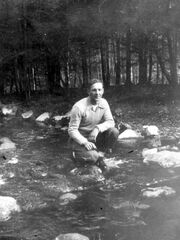
Joseph in the woods
Joseph liked to take walks in the woods and collect leaves and other natural specimens. He knew the name of nearly every type of tree he came across. He also planted different varieties of trees in his back yard.
Talk Radio[]
Joseph listened to talk radio. His favorite talk show host was Bernard Meltzer.
Polka Music[]
Joseph enjoyed Polish Polka music, and was proud of his Polish heritage. He often took his families to Polish festivals including festivals at Action Park in Sussex County, New Jersey, and at the shrine of Our Lad of Czestochowa in Pennsylvania. Joseph especially liked Jimmy Sturr and his orchestra, and owned several of his record albums.
Death[]
Joseph died August 21, 1997 from a massive heart attack while mowing his lawn in Brick Township. He died on the chair on his front porch. He was buried at the Our Lady of Czestochowa shrine in Pennsylvania, where he enjoyed attending Polish festivals.
Ancestors[]
Click here for a list of all known ancestors of Joseph John Szczesny.
Descendants[]
Of his daughters Kathy, Barbara and Deborah, Kathy had two sons, Kevin Borland and Steven Thomas Borland II, Barbara had a daughter Jill Czorniewy, and Deborah had a son Adam Carl Rice. Joseph's grandson Kevin is married and lives in Virginia. He has a 13-year-old stepson from Thailand, but no children of his own. Steven Thomas Borland II is married, but does not have any children yet. Jill Czorniewy is finishing high school, and lives at home with her parents. Adam Carl Rice is attending college in Pittsburgh, and is also still single.
Memories of Joseph's Descendants[]
- Kathleen Borland recalls that Joseph would take her for nightly walks in Jersey City to get the newspaper, and he would buy Kathleen an ice cream.
- Kevin Borland recalls that Joseph drove a Plymouth Valiant for most of the 1980s, and then a Dodge Aries K-Car for most of the 1990s. Margaret referred to Joseph as Cowboy Joe when he drove because of his style of driving. The car often jerked because he used one foot for the gas and the other for the brake.
- Kathleen Borland recalls that Joseph's first car was a green Pontiac, which had a Chief Pontiac hood ornament. He bought the car around 1949 or 1950. His next car was a Plymouth station wagon in the 1960s. His last car was a Buick Century, which Kathleen inherited (since Margaret did not drive).
- Please add your contributions here and add your name to the list of contributors below.
Contributors[]
- Kevin Borland (author of article, compiled and translated sources and conducted genealogical research on Joseph's ancestry)
- Joseph John Szczesny (provided essays on his war experience and told biographical stories to Kevin Borland)
- Margaret Rice (provided essays with information on Joseph and provided other information to Kevin Borland)
- Kathleen (Szczesny) Borland (provided recollections of her father)



